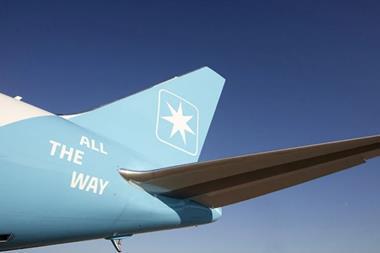Brexit means Brexit, but will it be a hard, soft, or red white and blue Brexit, and what are economic risks?
Britain’s departure from the European Union ─ set your calendar for March 2019 ─ was a key theme in ‘Navigating global trade in turbulent times’, a seminar organised by SEKO Logistics at Farnborough in the UK.
The half day conference set out to discuss the challenges and opportunities presented by changing times for the British aerospace, aviation, defence and security industries.
Markus Kuger, senior economist at Dun & Bradstreet (D&B), the commercial data consultancy, set the scene by explaining that the UK’s country risk rating was downgraded on June 24, 2016, when the UK referendum result was known and the pathway to Brexit was cleared.
D&B sets the risk profile rating from one (DB1) to seven (DB7). On June 23, the UK’s rating of DB2 – on a par with the US – was subject to a “significant downgrade” said Kuger, to DB2.5. It was to fall again in October, to DB2.75, making the UK the worst performing country in 2016 among 132 countries reviewed.
For comparison, Germany, Sweden and Norway are the “least risky” countries at DB1.75, while Syria, Afghanistan and Zimbabwe are the most risky, each with a DB7 rating.
Said Kuger: “Yes, there has been a deterioration in the score but, in the bigger picture, the UK is still considered a low risk country to do business in.”
In D&B’s credit environment outlook, the UK’s prompt payments performance is below the European average of 13 days, although investment sentiment is more positive, with bank lending to companies growing.
“Before the referendum, around 33% of payments were being made on time in the UK. Since the referendum, it has fluctuated a bit but stands at 31%. The share of prompt payments has come down, but not the landslide that some economists had expected.”
The average UK business to business payment delay is 16 days, compared with 19 days in Italy, 20 days in Ireland or almost a month in worst-performer Portugal. Those are all far below Germany and Netherlands where the average delay in the final quarter of 2016 was between six and seven days.
In terms of another metric, supply environment, the World Economic Forum’s (WEF) listing of overall infrastructure quality has the UK ranked 9th, just below Germany, but is number 27 when judged by road infrastructure. Said Kuger: “Given that the UK is a G7 economy and perceived as a rich state, then 27 out of 139 doesn't sound too good.”
The D&B baseline scenario for Brexit, the one it considers “likely” and the best case scenario from a country risk perspective, has the underlying assumption of an “amicable divorce” which means the UK and European Commission agree an exit payment, reach a settlement on citizenship, land borders and a transitional free trade agreement (FTA).
There is one caveat, a potential risk that the whole package could fail at the final stage because it still needs to be ratified by both the British and European parliaments.
Kuger described scenario B, “somewhat likely”, as the worst case scenario from country risk perspective because D&B would have to revise downwards its macro-economic forecasts.
This “nightmare” would mean there was no agreement on the size of the divorce bill and a British government walks away from the table, something which British Prime Minister Theresa May has described as “no deal is better than a bad deal”.
The UK would leave the EU on March 29 2019 and trade would be carried out under World Trade Organsiation (WTO) rules.
Said Kuger: “It would have huge disruptive effects for both sides, and we should be under no illusions, it would be painful for continental Europe as well, but the damage will be much, much bigger for the UK.”
He added: “The likelihood of scenario B to materialise has increased but it is still not the core scenario, and it is still more likely that things will turn out fine than end in a complete nightmare.”
Politicians favouring a Brexit, triggered by Article 50 of the EU treaty, often cite an FTA as something that can be achieved relatively easily.
Kuger made the point that a FTA has never been agreed in such a short notice as the two years stipulated under Article 50: “Greenland is the only country to leave the EU, and it took three years to negotiate the post-exit relationship, but Greenland a very small country that basically has one export product, which is fish.
“They [Greenland] don't export plane engines or have financial products or pharmaceuticals, so it was very easy to agree on the trade deal, which still took three years. Under Article 50 you [the UK] have two years, so that should give you an idea of how unrealistic it is to settle everything within that short notice.”
Hence the assumption that there will be a transitional process to a full FTA, with the latter coming into force around 2022 or 2023, at the latest.
There is also an attendant political risk for a transitional FTA, in that the EU member states will insist on free movement of people and adherence to the rule of the European Court of Justice, both anathemas to hard line Brexiteers.
May, if she wins the UK general election on June 8 with a landslide majority, will argue that her mandate allows her room to accept such a transitional period to a full FTA.
In a question and answer session, Kuger explained that an FTA is more than just duties and taxes, it is also about accepting certain rules.
He said: “I have heard in the UK that it can be successful trading under WTO standards, and Germany is quoted as an example. Last year, for the first time, the most important German export market was the US, but there is not an FTA between Germany and the US.
“It is true to some extent that they are trading under WTO standards, but there are so many special deals in place between certain sectors in Germany and the US that effectively they are not trading under WTO standards.
“Germany and the US have legislation in place that enables them to facilitate trade, and this took a lot of time to negotiate and is something that we will see in the UK too.”
He added: “If you want to trade under WTO standards, it is not a problem for some sectors but the tariffs in agriculture are about 40%. A Welsh sheep farmer selling lamb to a restaurant in Paris will face a 40% tariff.”
Brexiteers also quote the German car industry, which sells a lot of vehicles to the UK, claiming that those car manufacturers would oppose a tough line by Berlin on UK trade arrangements.
Kuger was less optimistic: “Over 7% of Germany’s overall exports go to the UK, but if we look at cars, that figure goes up to 20%, so for the German car sector the UK is a big market. But even the federal association of car producers are saying if we give the UK a special deal, just for short term gain, then the whole of the EU could break down and the economic damage for us [German car makers] could be much, much bigger.”
The argument being that German carmakers are willing to take a temporary hit in losing an export channel rather than give the UK a better deal than being a member of the EU.
We will know more after the UK general election when the government begins negotiations with the European Commission in Brussels.










